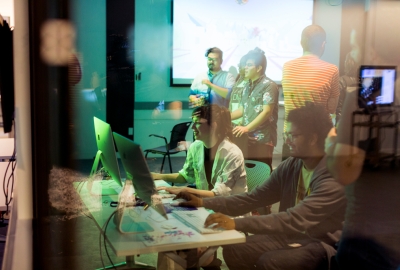Physical Theatre is the study of physical, vocal & improvisational exercises designed to free the creative imagination & develop performance skills. Through the layering of words, sound & movement, students will hone the essential ingredients & tools of the performer's craft. Focus will be on vocal & movement techniques exploring atmosphere, imagery, gesture, isolation, abstraction,
timing, rhythm, spatial awareness, character development, mime, body graphics, viewpoints, & the theories of Yakim, Delsarte & Laban. The creation of original material will also be studied.
Course #
MPAET-GE 2113
Credits
3
Department
Music and Performing Arts Professions


